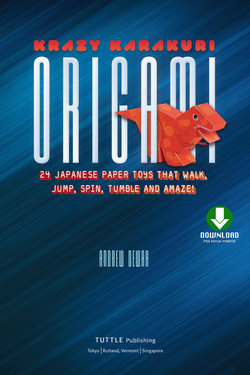Читать книгу Krazy Karakuri Origami - Andrew Dewar - Страница 6
На сайте Литреса книга снята с продажи.
ОглавлениеTools and Techniques
toothpicks
ruler
scissors
craft knife
tweezers
nail clippers
white school glue
rubber bands
mountain fold
valley fold
guide line
Use a ruler when you fold the paper. This will give you crisp, straight creases without weakening the paper.
Where the paper is curved, gently bend it with your fingers to “train” it before gluing. This will preserve its spring and prevent buckling and creasing.
Use a toothpick to help you roll up ballast and bearings. Roll the paper tightly around the toothpick, fasten the very end with a drop of glue, and pull out the toothpick. For bearings, loosen the roll very slightly before gluing, just enough that they turn freely.
You can push out the larger parts with your fingers, but the paper will be less likely to crease or tear if you use a craft knife to cut them loose. Cut slits carefully with scissors.
Carefully trim the flash from around the edges of parts you have pushed out. This will make them look cleaner and fit together better.
Don’t worry if you accidentally cut the wrong thing. In most cases you can patch up the cut from the inside with a small scrap of paper. Butt the two edges together, and glue the patch behind it, or between two parts. If the patch is small, it won’t affect the balance.
Use a toothpick to spread a drop of glue evenly over the whole surface to be glued. Very little is needed; in fact, a transparent film sticks much better than a thick layer. A little glue will make strong, clean joints. Too much glue will warp the paper and ooze out at the edges, and make your toy look messy and grimy. I recommend that you practice with scraps of paper before gluing actual parts.
Nail clippers are great for cutting toothpicks to the right length. Snip the ends off after putting the toothpicks in place, and then seal them in place with a dab of glue.
Use tweezers to hold smallish parts and firmly press glue tabs together.
